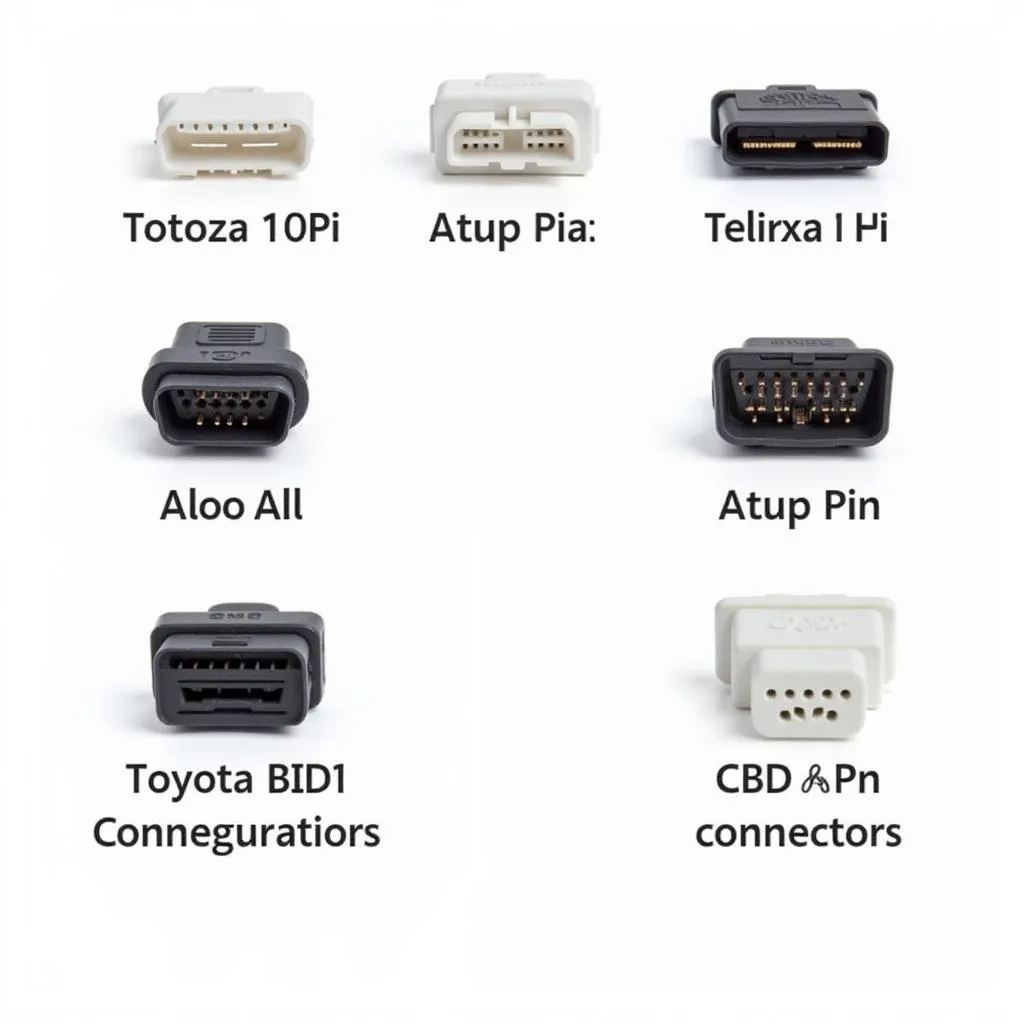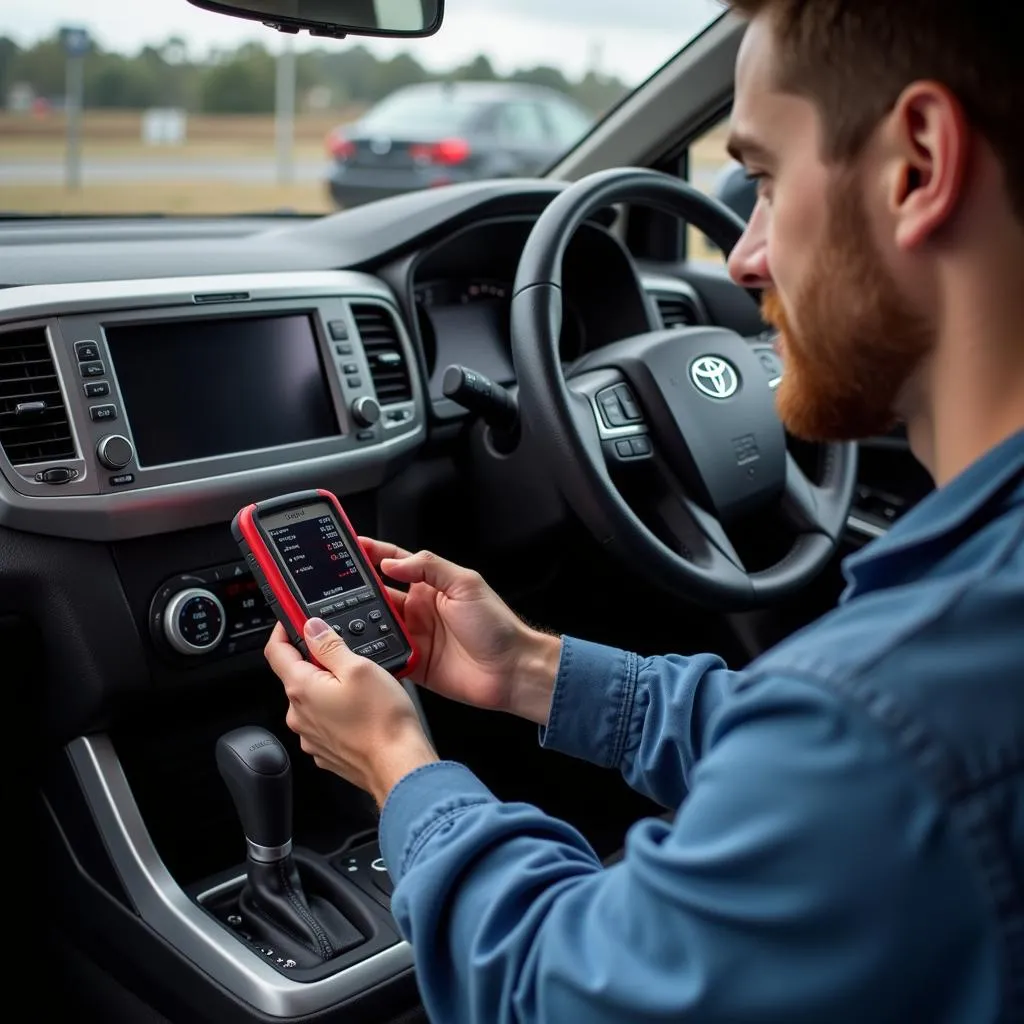Understanding the inner workings of your Toyota, especially those manufactured before 1996, often requires specialized equipment. This is where an OBD1 scan tool specifically designed for Toyota vehicles becomes indispensable. Unlike their OBD2 counterparts, OBD1 systems varied significantly between manufacturers and even models. This guide delves into the world of OBD1 scan tools for Toyota, equipping you with the knowledge to make informed decisions about diagnosing and maintaining your vehicle.
Navigating the World of Toyota OBD1 Scan Tools
Before the standardization of OBD2 in 1996, car manufacturers utilized their proprietary diagnostic systems. Toyota, known for its diverse model range, employed a system known as Toyota Diagnostic Check Connectors (DLC1). These connectors, unlike the familiar 16-pin OBD2 port, differed in shape, pin configuration, and diagnostic protocols.
 Toyota OBD1 Connector
Toyota OBD1 Connector
This lack of uniformity necessitates using a scan tool specifically designed for Toyota’s OBD1 systems. These tools act as a bridge between your vehicle’s computer and you, translating complex diagnostic data into understandable information.
Why You Need a Toyota OBD1 Scan Tool
Owning a Toyota OBD1 scan tool offers several advantages, particularly for owners of older models:
- Accurate Diagnosis: Pinpoint the root cause of illuminated check engine lights or other performance issues, saving time and money on unnecessary repairs.
- Enhanced Understanding: Gain deeper insights into your vehicle’s health by accessing real-time data from various sensors, including engine RPM, coolant temperature, and throttle position.
- DIY Repairs: Empower yourself to perform basic repairs and maintenance tasks with the help of the trouble codes and data provided by the scan tool.
- Cost Savings: Avoid expensive trips to the mechanic for simple diagnostic procedures.
 Mechanic Diagnosing Toyota with OBD1 Scanner
Mechanic Diagnosing Toyota with OBD1 Scanner
Choosing the Right OBD1 Scan Tool for Your Toyota
The market offers a range of OBD1 scan tools tailored for Toyota vehicles. Consider these factors when making your selection:
- Model Compatibility: Ensure the scan tool supports the specific year, make, and model of your Toyota. Some tools may be limited to certain model years or engine types.
- Features and Functionality: Determine the level of detail and diagnostic capabilities you require. Basic code readers provide fault codes, while advanced scanners offer live data streaming, sensor readings, and bi-directional control.
- User Interface: Opt for a tool with a user-friendly interface, clear display, and intuitive navigation for ease of use.
- Price and Value: Balance your budget with the features and functionality offered by different scan tools.
“Investing in the right OBD1 scan tool for your Toyota is crucial,” says John Miller, a seasoned automotive engineer. “It’s not just about reading codes; it’s about understanding your vehicle’s language.”
Using Your OBD1 Scan Tool: A Step-by-Step Guide
Using an OBD1 scan tool might seem daunting, but the process is relatively straightforward:
- Locate the DLC1 Connector: Refer to your vehicle’s owner’s manual for the location of the DLC1 connector. It is usually located under the dashboard on the driver’s side.
- Connect the Scan Tool: Plug the scan tool into the DLC1 connector.
- Turn the Ignition On: Turn the ignition to the “on” position without starting the engine.
- Access Diagnostic Modes: Follow the on-screen prompts or instructions provided with your specific scan tool to access different diagnostic modes.
- Retrieve and Interpret Codes: The scan tool will display any stored trouble codes. Refer to a reliable source for code definitions and potential causes.
- Clear Codes: After addressing the underlying issue, use the scan tool to clear the codes and verify the problem is resolved.
 DIY Car Repair with OBD1 Scanner
DIY Car Repair with OBD1 Scanner
Common Toyota OBD1 Trouble Codes
Understanding common Toyota OBD1 trouble codes can provide valuable insights into potential issues:
- Code 21: Oxygen Sensor Signal
- Code 22: Water Temperature Sensor Signal
- Code 24: Intake Air Temperature Sensor Signal
- Code 25: Knock Sensor Signal
- Code 31: Vehicle Speed Sensor Signal
It’s important to note that these are just a few examples, and specific code definitions may vary depending on your Toyota model year. Always refer to a reliable source for accurate code information.
Beyond Diagnostics: The Future of OBD1
While OBD1 technology might seem outdated in the age of advanced onboard computers, enthusiasts and classic car owners continue to recognize its value. Moreover, the increasing availability of aftermarket adapters and Bluetooth-enabled OBD1 scan tools brings new life to these older systems. These advancements allow for data logging, performance monitoring, and even smartphone integration, bridging the gap between classic cars and modern diagnostic capabilities.
Conclusion
Investing in a dedicated OBD1 scan tool for your Toyota is a wise decision for any owner seeking to demystify their vehicle’s inner workings. Whether you’re a seasoned DIYer or simply want greater control over your car’s maintenance, the right scan tool can empower you with knowledge and save you money in the long run.
Remember, understanding your Toyota’s OBD1 system is more than just reading codes; it’s about unlocking a deeper connection with your vehicle and ensuring its longevity.
Frequently Asked Questions
1. Can I use an OBD2 scan tool on my OBD1 Toyota?
No, OBD1 and OBD2 systems are not compatible. You will need a scan tool specifically designed for Toyota’s OBD1 system.
2. Where can I find reliable OBD1 trouble code definitions for my Toyota?
Refer to your vehicle’s service manual or consult online resources dedicated to Toyota OBD1 codes.
3. Can I clear OBD1 trouble codes myself?
Yes, most OBD1 scan tools allow you to clear codes after addressing the underlying issue.
4. Are OBD1 scan tools expensive?
The price of OBD1 scan tools for Toyota can vary depending on their features and functionality. Basic code readers are generally more affordable while advanced scanners with live data and other capabilities are more expensive.
5. Are there any modern alternatives to traditional OBD1 scan tools?
Yes, aftermarket adapters and Bluetooth-enabled OBD1 scan tools are becoming increasingly popular, offering features like data logging, smartphone integration, and enhanced diagnostic capabilities.
Need further assistance? Don’t hesitate to reach out to our expert team via WhatsApp: +1(641)206-8880, Email: [email protected] Or visit us at: 276 Reock St, City of Orange, NJ 07050, United States. We’re available 24/7 to assist you! For more information on launch obd scanner, launch obdii scanner and other related products, explore our website. You can also find helpful articles on our blog about launch obd2 and launch obd ii scanner for a deeper understanding.